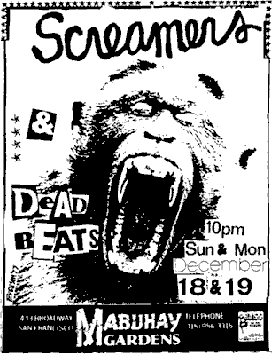Back on this day 25 years ago...........SUNDAY DECEMBER 18th 1977
1977
 DATE INDEX
|
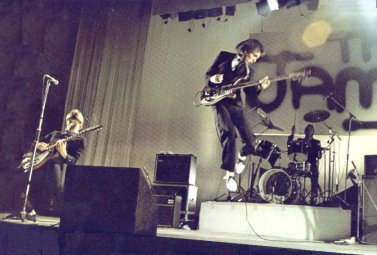   Hammersmith Odeon, London
"VISS ISSA moduhn whirl, viss issa modiihn whirl."
The Jam sing as though they're auditioning for the Brut commercial with Henry Cooper. And Paul Weller sounds like he could be a direct descendant of his great namesake, Samuel. But then part of the appeal of the New Wave is their readiness to sing in English rather than American, and you don't need to see the Union Jacks strewn about the stage to spot The Jam's origins.
Weller's lyrics are liberally sprinkled with references to life among the tower blocks, but neither his words nor the tuneless vocals are what draws the crowds.
They're there for The Jam's undoubted instrumental prowess, and the band are clearly so hot that the parallels with The Who are rendered redundant.The debt to The Who's first album is undeniable, but Pete Townshend has rarely played with such sustained intensity as Weller musters on stage. And the elaborate flamboyant fills that are Keith Moon's trademark must seem like decadent luxuries to Rick Buckler. The Jam move so fast, there's just no room for that kind of indulgence. Indeed, at times, that uniform of suits and ties gives the band the look of harrassed office boys. The sort that open the bomb mail, but never get to join The Clash.
But that kind of impression is misleading. Because complete control is exactly what The Jam have the most. There is very little that is spontaneous about the excitement they generate. It's strictly a matter of sharp musical judgement, and unlimited adrenalin. Paul Weller would have made it with or without the New Wave. He is simply one of the smartest pop songwriters around. It's the hits that prompt the most fervent crowd response - with "All Around The World" saved for the exultant encore.
But there are lots of goodies from the albums, which has led to other reviewers to mourn the use of some potential classics as mere space fillers. The likes of "In The Street Today", "London Girl", "I Need You", and "Here Comes The Weekend" are all notable cases in point. But, of course, if these guys eased up in their headlong dash for rock supremacy, they'd no doubt lose their distinctive edge. Too much finely calculated pace, and they'd be nowhere.
Earlier, New Hearts showed that they have a good deal more chance of success than one of Doctor Christian Barnard's baboon transplants. But the wit of songs like "Another Teenage Anthem" and "Here Come The Ordinaries" is somewhat lost at 100 decibels.And petulant hints that The Jam were in some way responsible for the duff sound were a good means of alienating sectors of the crowd.
There was nothing phoney about their encore, though, and it won't be long before the Hearts are headlining their own tour. Especially with all that lovely CBS money behind them.It's all come a long way from the original notion of dole queue kids snubbing the system. But naturally it was bound to. - (Bob Edmands - New Musical Express 1977)
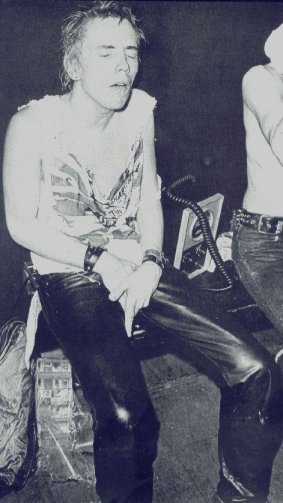  Johnny Rotten has the flu and tonights gig in Wolverhampton is cancelled till later on in the week...unlucky for some but a particular lucky twist of fate for me!
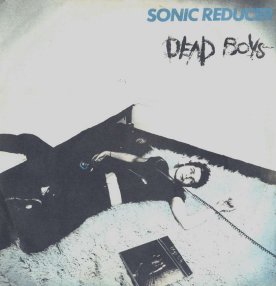  having survived their debut UK supporting the Damned the Cleveland snot rockets release their debut classic, the snotty nihilistic 'Sonic Reducer' out on Sire Records.
Writers: Stiv Bators, Jimmy Zero, Cheetah Chrome, Johnny Blitz, Jeff Magnum, David Thomas. Producer: Genya Ravan Personnel: Bators (vcs), Chrome (gtr), Zero (gtr), Magnum (bs), Blitz (drs)
THE DEAD BOYS Sonic Reducer SIRE, DECEMBER 1977
HARD TO believe that the dumb Dead Boys and cerebral Pere Ubu emerged from the same band. Sonic Reducer is the aural proof. Started by future Ubu roi David Thomas and Chrome (Gene O'Connor), Sonic Reducer typifies their joint band Rockets From The Tombs' brief, volatile fusion of LIS punk's arty and rock-out
factions. Stiv Bators sings a vocal of Iggy-derived dementia, while Chrome's scorching guitar hints at the Rockets' sonic invention. The song's success meant the Boys ousted their arty cousins to become kings of the CBGB's scene (they were managed by its owner, Hilly Kristal). They then pursued their worst instincts up a blind alley, splitting for the last time in 1980. Ten years later, Bators died in car accident. (TM - MOJO October 2001)
"The song is about adolescent alienation and the desperation that results, which means it was a typical song for the so-called punk genre."
Jimmy Zero, 2001
|

